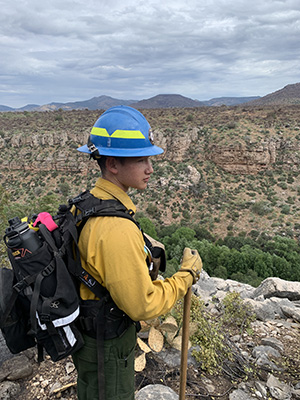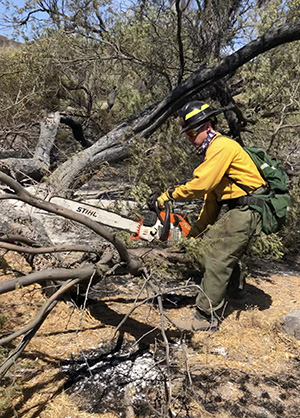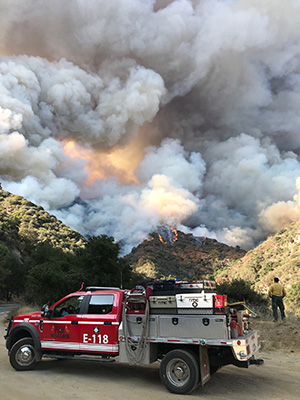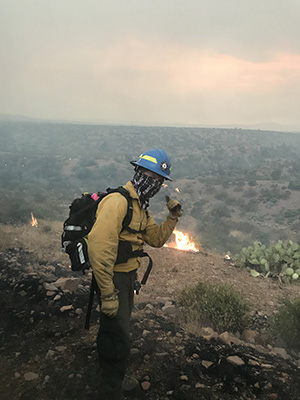
By Mike Kilen
GCU News Bureau
The Bush Fire was raging in June across the Tonto National Forest south of Payson, Ariz. It was a big one that eventually would cover nearly 200,000 acres. The contract firefighting crew that Christian Simmons had joined was called in, and he saw hotshots from Flagstaff lighting up a fire barrier by a road.
The junior student at Grand Canyon University was firmly in the moment amid a historically scorching hot summer during one of the worst seasons for wildfires in the West.
“The fire came up over the hill. Ten-foot flames,” he said. “We were holding this line, and it was so smoky it teared up your eyes, but we had to make sure it didn’t jump into houses.”
A commander ran to a home to get residents out. Simmons scrambled to help the Timber Ridge Engine 118 team unroll two hose lines.
“You couldn’t see or breathe. It was instinct. If you don’t stop this, it will hit this house.”
****

Some students spent their summer in quarantine because of the pandemic. Simmons was facing a different killer.
The 2018 Students Inspiring Students (SIS) scholarship recipient at GCU can share a thing or two about finding purpose.
He always thought he’d join the military because he wanted to serve. But when he was accepted into the Franklin Police and Fire Academy, part of the Phoenix Union High School District in Phoenix, he saw another path.
“I loved being outdoors and pushing my body to the limit,” he said. “And the science of how fire works caught my attention. I looked forward to going to school.”
He trained in wildland fire -- working a chainsaw, digging lines and taking physical tests that require carrying a 45-pound pack, plus water that makes it 100 pounds, in 100-degree heat.
He learned that you are always trying to take away what a fire needs -- a heat source, oxygen and fuel -- by digging barriers, fighting fire with fire or reading the wind.
“Fire is a living thing,” he said.
****

Forty minutes into fighting the Bush Fire, the flames jumped toward the house.
Five times he had been called out to fires over the summer, but this one was intense. You never know when you’ll get the call, Simmons said. You grab your gear, which takes you away from your home for up to two weeks as your parents pray for you, and hit the ground running.
“When you roll up to a fire, sometimes they shoot you to the line right away,” he said.
Jeff Todd, his engine boss, said Simmons brings enthusiasm and hunger: "He's a true professional and is a very skilled firefighter who is eager to learn."
At age 20, Simmons is often among the young guys digging up the ground for barriers, fast and furious.
But when the flames are leaping, you rotate in to take the hose, as he did that day.
“You can fight it for a minute and then you can’t breathe,” he said.
****

The SIS scholarship in 2018 didn’t take him away from the fires but continued to lead him to service by seeking a degree in Government with an Emphasis in State and Local Public Policy.
“I thank God every day I got it; it gave me an opportunity to go to college,” he said.
He wants to join a fire department one day, and the major will help him rise the ranks because he’ll know about public policy from his courses, he said.
When you get a job in the public service field, it’s on merit, said Evelyn Racette, one of his GCU instructors in the College of Humanities and Social Sciences. “It’s not a who knows who. He's got to be good to get the job, and he is good,” she said.
As an administrator in a department, she said you also must walk a “political tightrope” because at times elected officials will be looking over your shoulder on policy decisions.
“Christian will succeed there. He has seen it happen in the real world,” he said. “And I think he’s got a heart for people.”
Saving people, saving structures. That’s what Simmons said his purpose was this summer.
****

The beauty and tragedy of the mountain forest was on display that day.
“I love being out there. You get to see the beautiful country that God has made,” he said.
But it’s also like sports, pushing yourself to the limit, facing the obstacles with a group of firefighters who become like brothers.
“When the fire jumps your line, it brings you down, but you have to re-engage,” he said.
You never know what a fire is going to do. It has helped him mature – to always be ready for sudden changes, to not procrastinate, to learn how to deal with different personalities.
That day in the Tonto, the flames were beaten back short of the home.
“We held it off just in time,” he said.
“You wipe away the soot from your eyes, and you get right back to work, doing mop-up, digging and making sure nothing will relight,” he said. “You work into the night. I think we were there 20 hours that day.
“You don’t think about it until the next day that you could have been hurt in the process, but it’s definitely an adrenaline rush. You’re like, ‘I’m ready for the next one.’”
He’ll be back at school Monday, but he thinks about “his guys” out in California, still battling the wildfires, and part of him wants to be there with them.
Grand Canyon University senior writer Mike Kilen can be reached at [email protected] or at 602-639-6764.
****
Related content:
GCU Today: Her job shows how SIS scholarship program works
GCU Today: It’s clubhouse to firehouse for former GCU players
GCU Today: Students create plans for police-community relations



































































